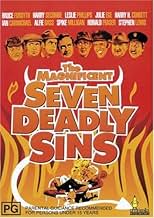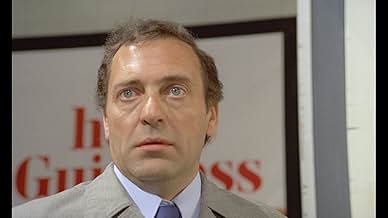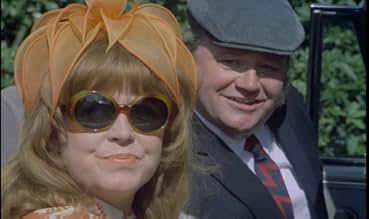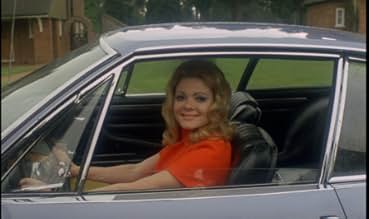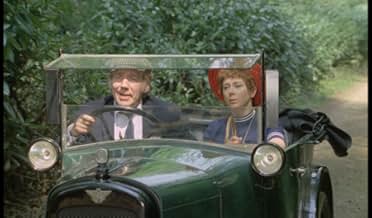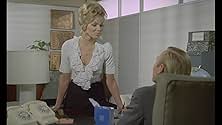Ajouter une intrigue dans votre langueThis early Seventies British comedy takes us through seven short stories based on the Seven Deadly Sins. This film is a montage of different styles, from Spike Milligan's mainly silent "Slot... Tout lireThis early Seventies British comedy takes us through seven short stories based on the Seven Deadly Sins. This film is a montage of different styles, from Spike Milligan's mainly silent "Sloth", to the leering Harry H Corbett in "Lust".This early Seventies British comedy takes us through seven short stories based on the Seven Deadly Sins. This film is a montage of different styles, from Spike Milligan's mainly silent "Sloth", to the leering Harry H Corbett in "Lust".
- Réalisation
- Scénario
- Casting principal
Suzanne Heath
- Chloe (segment "Avarice")
- (as Susanne Heath)
Rosemarie Reede
- Woman (segment "Gluttony")
- (as Rosemarie Reed)
Avis à la une
Look at the cast list of this film; try and name someone famous in late 1960s British comedy who is not there. It is not easy. This film had a huge comic talent to call on, a promising premiss, writers-a-go-go and the head-start of a fairly funny punning title. Where did they go wrong? Where did they go right?! Here is a question: into which of the 7 deadly sins would one normally put the notoriously leering Casanova Leslie Phillips? If you answered 'Gluttony' you are absolutely correct! He eats his way through a load of éclairs and has a heart attack. Spike Milligan's segment--Sloth--is probably the best overall, mainly because it is silent. However, director Graeme Stark has written quite a small masterpiece in 'Lust'--a more or less one man play with the sadly-missed Harry H Corbett. He plays the rather sad Ambrose Twombly (the fastest lighter on the Bakerloo). This is my favourite segment although it is clouded by a pathetic ending. It is worth watching this film; I think anyone would definitely enjoy it. But when it is over you will probably think, as I did, 'Why wasn't that funnier?'
I'm a fan of Leslie Phillips, one of the all-time funniest British actors in UK history. The geniuses in Hollywood never utilized his talent, so screw them, I say. This is the second film he appeared in with the exquisite Julie Ege of Norway, a one time Hammer starlet in Creatures The World Forget. The underground segment with Harry Corbett is more noteworthy and sad than humorous.
A collage film, made up of many episodes without any connection between them. It should be Comedy, but it isn't. Not even an episode has fun, everything is without salt and without pepper, super-boring. Unfortunately for all the actors involved, obviously many talented, they are trapped without escape in some very bad scenarios. If Benny Hill or Rowan Atkinson had played all the roles, I think it would have been a success.
Graham Stark brings one of the great casts in British film history - a great if uneven time capsule.
I remember watching this on Granada on a Sunday afternoon, I doubt it'll ever turn up on anything bar the wonderful Talking pictures...
anyway as with most Portmanteau films if you don't enjoy one bit...wait for the next!
Wish sometimes I was born earlier to see some of films in the cinema...
I remember watching this on Granada on a Sunday afternoon, I doubt it'll ever turn up on anything bar the wonderful Talking pictures...
anyway as with most Portmanteau films if you don't enjoy one bit...wait for the next!
Wish sometimes I was born earlier to see some of films in the cinema...
I first saw this film as a child, and it's stayed with me all these years - with its certain familiarity and a hankering for times gone by, when comedy was a lot more unsophisticated and didn't always require a great deal of intellectual engagement.
Viewing it now, all these decades later, its many flaws are apparent - and it must take a fair bit of dedication for anyone to want to sit through it!
As the title suggests, the film revolves around each of the seven deadly sins, with an individual segment for each one of around 15 mins. These are written and directed by different people, and have a different cast each time.
One bonus of this is the huge and familIar cast of the great and good of British comedy from this period in the early 70s - though perhaps not many would be recognizable outside these shores.
The comedy, such as it is though, is laboured, cheesy and sadly nearly always misses the mark.
The first two segments (starring Bruce Forsyth and Harry Secombe) are strangely compelling - despite their absurdities and daft endings.
Things take a dip though with a muddled third segment - starring the reliable Leslie Phillips in a role typically suited to his caddish and lecherous on-screen image, and surely written with him in mind.
Harry H Corbett stars in the fourth segment - it's one of the better stories here (set mostly on a tube train and tube station), but suffers from a decidedly corny ending - one that's also a bit sad too.
The fifth segment, starring Ian Carmichael and Alfie Bass is probably the best of this weak bunch. It studies class differences, and how this is tackled when a wealthy man in a Rolls-Royce meets a more humble man in a battered old jalopy head-on in a narrow country lane, with neither party willing to swallow their pride and back up to let the other car go.
After this highlight though, things fall apart with the final two segments. The first is a silent comedy starring Spike Milligan (among others) and feels very forced. It fails to raise any laughs, or even anything in the way of entertainment - and the bar hadn't exactly been set very high.
The final segment is a ludicrous story of two men who want to murder the oppressive local park keeper (played by 'On the Buses' Stephen Lewis), and this sorry and laughter-free story can't end soon enough...
All in all then, a real hotch-potch of poor comedy, and one that does its many stars a great disservice.
I guess it's worth watching these days just for its oddity value - like 'it's so bad it's good' kind of thing.
My favorite part was spotting the locations in and around Pinewood Studios, and also spotting all the many famous faces, some in quite minor or supporting roles too.
View at your peril, but be warned - 'Carry On' this is not!
Viewing it now, all these decades later, its many flaws are apparent - and it must take a fair bit of dedication for anyone to want to sit through it!
As the title suggests, the film revolves around each of the seven deadly sins, with an individual segment for each one of around 15 mins. These are written and directed by different people, and have a different cast each time.
One bonus of this is the huge and familIar cast of the great and good of British comedy from this period in the early 70s - though perhaps not many would be recognizable outside these shores.
The comedy, such as it is though, is laboured, cheesy and sadly nearly always misses the mark.
The first two segments (starring Bruce Forsyth and Harry Secombe) are strangely compelling - despite their absurdities and daft endings.
Things take a dip though with a muddled third segment - starring the reliable Leslie Phillips in a role typically suited to his caddish and lecherous on-screen image, and surely written with him in mind.
Harry H Corbett stars in the fourth segment - it's one of the better stories here (set mostly on a tube train and tube station), but suffers from a decidedly corny ending - one that's also a bit sad too.
The fifth segment, starring Ian Carmichael and Alfie Bass is probably the best of this weak bunch. It studies class differences, and how this is tackled when a wealthy man in a Rolls-Royce meets a more humble man in a battered old jalopy head-on in a narrow country lane, with neither party willing to swallow their pride and back up to let the other car go.
After this highlight though, things fall apart with the final two segments. The first is a silent comedy starring Spike Milligan (among others) and feels very forced. It fails to raise any laughs, or even anything in the way of entertainment - and the bar hadn't exactly been set very high.
The final segment is a ludicrous story of two men who want to murder the oppressive local park keeper (played by 'On the Buses' Stephen Lewis), and this sorry and laughter-free story can't end soon enough...
All in all then, a real hotch-potch of poor comedy, and one that does its many stars a great disservice.
I guess it's worth watching these days just for its oddity value - like 'it's so bad it's good' kind of thing.
My favorite part was spotting the locations in and around Pinewood Studios, and also spotting all the many famous faces, some in quite minor or supporting roles too.
View at your peril, but be warned - 'Carry On' this is not!
Le saviez-vous
- AnecdotesThe segments "Pride" and "Lust" had originally been television plays in the series Comedy Playhouse (1961)
- GaffesIn the Pride section, the Rolls Royce has, at first, both the RAC and AA badges as it travels down the lane, then only one, the RAC badge, for the rest of the piece.
- Crédits fousFelicity Devonshire tops the cast list during the end credits, but instead of receiving a written character description, she is represented by a drawing of how she appears in the film.
- ConnexionsReferences Naissance d'une nation (1915)
- Bandes originalesEnvy, Greed An' Gluttony
(the Seven Deadly Sins theme)
Sung by Middle of the Road (as The Middle Of The Road)
Written by Roy Budd and Jack Fishman
Meilleurs choix
Connectez-vous pour évaluer et suivre la liste de favoris afin de recevoir des recommandations personnalisées
- How long is The Magnificent Seven Deadly Sins?Alimenté par Alexa
Détails
- Date de sortie
- Pays d’origine
- Langue
- Aussi connu sous le nom de
- Die herrlichen sieben Todsünden
- Lieux de tournage
- Mount Fidget, Fulmer Rise, Fulmer, Slough, Angleterre, Royaume-Uni(House in 'Envy' segment)
- Société de production
- Voir plus de crédits d'entreprise sur IMDbPro
Contribuer à cette page
Suggérer une modification ou ajouter du contenu manquant

